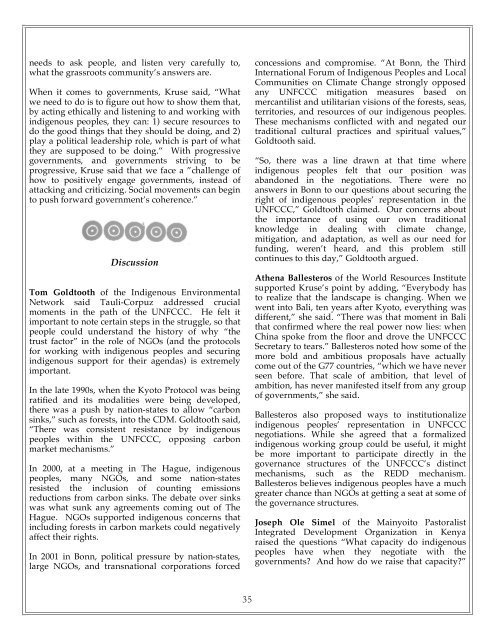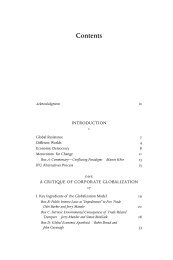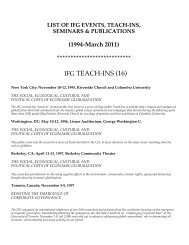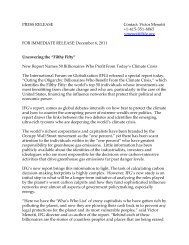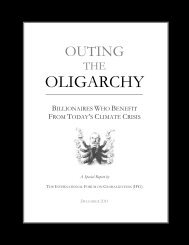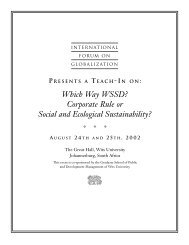UNDRIP Report - English FINAL - International Forum on Globalization
UNDRIP Report - English FINAL - International Forum on Globalization
UNDRIP Report - English FINAL - International Forum on Globalization
You also want an ePaper? Increase the reach of your titles
YUMPU automatically turns print PDFs into web optimized ePapers that Google loves.
needs to ask people, and listen very carefully to,<br />
what the grassroots community’s answers are.<br />
When it comes to governments, Kruse said, “What<br />
we need to do is to figure out how to show them that,<br />
by acting ethically and listening to and working with<br />
indigenous peoples, they can: 1) secure resources to<br />
do the good things that they should be doing, and 2)<br />
play a political leadership role, which is part of what<br />
they are supposed to be doing.” With progressive<br />
governments, and governments striving to be<br />
progressive, Kruse said that we face a ”challenge of<br />
how to positively engage governments, instead of<br />
attacking and criticizing. Social movements can begin<br />
to push forward government’s coherence.”<br />
Discussi<strong>on</strong><br />
Tom Goldtooth of the Indigenous Envir<strong>on</strong>mental<br />
Network said Tauli-Corpuz addressed crucial<br />
moments in the path of the UNFCCC. He felt it<br />
important to note certain steps in the struggle, so that<br />
people could understand the history of why “the<br />
trust factor” in the role of NGOs (and the protocols<br />
for working with indigenous peoples and securing<br />
indigenous support for their agendas) is extremely<br />
important.<br />
In the late 1990s, when the Kyoto Protocol was being<br />
ratified and its modalities were being developed,<br />
there was a push by nati<strong>on</strong>-states to allow “carb<strong>on</strong><br />
sinks,” such as forests, into the CDM. Goldtooth said,<br />
“There was c<strong>on</strong>sistent resistance by indigenous<br />
peoples within the UNFCCC, opposing carb<strong>on</strong><br />
market mechanisms.”<br />
In 2000, at a meeting in The Hague, indigenous<br />
peoples, many NGOs, and some nati<strong>on</strong>-states<br />
resisted the inclusi<strong>on</strong> of counting emissi<strong>on</strong>s<br />
reducti<strong>on</strong>s from carb<strong>on</strong> sinks. The debate over sinks<br />
was what sunk any agreements coming out of The<br />
Hague. NGOs supported indigenous c<strong>on</strong>cerns that<br />
including forests in carb<strong>on</strong> markets could negatively<br />
affect their rights.<br />
In 2001 in B<strong>on</strong>n, political pressure by nati<strong>on</strong>-states,<br />
large NGOs, and transnati<strong>on</strong>al corporati<strong>on</strong>s forced<br />
c<strong>on</strong>cessi<strong>on</strong>s and compromise. “At B<strong>on</strong>n, the Third<br />
<str<strong>on</strong>g>Internati<strong>on</strong>al</str<strong>on</strong>g> <str<strong>on</strong>g>Forum</str<strong>on</strong>g> of Indigenous Peoples and Local<br />
Communities <strong>on</strong> Climate Change str<strong>on</strong>gly opposed<br />
any UNFCCC mitigati<strong>on</strong> measures based <strong>on</strong><br />
mercantilist and utilitarian visi<strong>on</strong>s of the forests, seas,<br />
territories, and resources of our indigenous peoples.<br />
These mechanisms c<strong>on</strong>flicted with and negated our<br />
traditi<strong>on</strong>al cultural practices and spiritual values,”<br />
Goldtooth said.<br />
“So, there was a line drawn at that time where<br />
indigenous peoples felt that our positi<strong>on</strong> was<br />
aband<strong>on</strong>ed in the negotiati<strong>on</strong>s. There were no<br />
answers in B<strong>on</strong>n to our questi<strong>on</strong>s about securing the<br />
right of indigenous peoples’ representati<strong>on</strong> in the<br />
UNFCCC,” Goldtooth claimed. Our c<strong>on</strong>cerns about<br />
the importance of using our own traditi<strong>on</strong>al<br />
knowledge in dealing with climate change,<br />
mitigati<strong>on</strong>, and adaptati<strong>on</strong>, as well as our need for<br />
funding, weren’t heard, and this problem still<br />
c<strong>on</strong>tinues to this day,” Goldtooth argued.<br />
Athena Ballesteros of the World Resources Institute<br />
supported Kruse’s point by adding, “Everybody has<br />
to realize that the landscape is changing. When we<br />
went into Bali, ten years after Kyoto, everything was<br />
different,” she said. “There was that moment in Bali<br />
that c<strong>on</strong>firmed where the real power now lies: when<br />
China spoke from the floor and drove the UNFCCC<br />
Secretary to tears.” Ballesteros noted how some of the<br />
more bold and ambitious proposals have actually<br />
come out of the G77 countries, “which we have never<br />
seen before. That scale of ambiti<strong>on</strong>, that level of<br />
ambiti<strong>on</strong>, has never manifested itself from any group<br />
of governments,” she said.<br />
Ballesteros also proposed ways to instituti<strong>on</strong>alize<br />
indigenous peoples’ representati<strong>on</strong> in UNFCCC<br />
negotiati<strong>on</strong>s. While she agreed that a formalized<br />
indigenous working group could be useful, it might<br />
be more important to participate directly in the<br />
governance structures of the UNFCCC’s distinct<br />
mechanisms, such as the REDD mechanism.<br />
Ballesteros believes indigenous peoples have a much<br />
greater chance than NGOs at getting a seat at some of<br />
the governance structures.<br />
Joseph Ole Simel of the Mainyoito Pastoralist<br />
Integrated Development Organizati<strong>on</strong> in Kenya<br />
raised the questi<strong>on</strong>s “What capacity do indigenous<br />
peoples have when they negotiate with the<br />
governments? And how do we raise that capacity?”<br />
35


